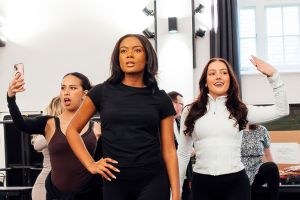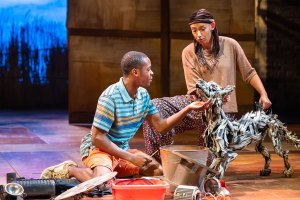Q&A with Tenor Piotr Beczala
Polish tenor Piotr Beczala made his first appearance at Covent Garden in 2004, as the Italian Tenor in Der Rosenkavalier, a small role in which he made a huge impact. Since then, he’s returned in Faust and Rigoletto, and now makes his house debut in La bohème.
Born in Southern Poland, he trained and made a career in his homeland before moving to Linz, Austria, where he continued to toil in a wide range of roles before hitting the big time in Zurich. Since then he’s become a sought-after lyric tenor, with appearances at all the world’s major opera houses.
I met him in his dressing room in a break in rehearsals at Covent Garden, where I fired a series of questions at him:
SIMON THOMAS: In this run, you’re working with three different conductors and two Mimis. How easy/difficult is that?
PIOTR BECZALA: I don’t know yet (laughs). I don’t know my second Mimi but most of the others I do. It’s actually very simple. After just one rehearsal, you generally find you’re on the same wavelength. You need that with the conductor, musically and intellectually. But every performance you do, in different productions, is different anyway. It can be a problem if two conductors are very different but, here, they talk and stand in at the others’ rehearsals. It’s normal in the opera world.
What does the role of Rodolfo mean to you?
Rodolfo is a basic role for the lyric tenor. When I was a student it was a dream to sing it. Every great tenor sings it and it lies in the centre of my work now. Bohème is in the middle of my repertoire and I hope to keep it there for many years. I first sang it in Amsterdam in 2002, then had a break for a few years, did it last year and have done it four times this year.
How do you bring something new or unique to such a frequently performed role?
It’s a basic problem for every role, though not particularly for Bohème. Maybe more for, say, Magic Flute. Tamino isn’t a lot of fun but Rodolfo is. You always have a different cast so it’s easy not to make it automatic. It’s a fixed part of my repertoire – the four productions this year wasn’t planned but it’s been quite special.
How do you feel about John Copley’s production?
It’s a very traditional, beautiful production. I have nothing against modern productions but sometimes you have to get away from these intellectual approaches. Audiences often want to see on the stage what they read in the synopsis. It can be a problem for them when the curtain opens and it’s not. It’s possible to have a very fresh, old production and a boring “modern” one, as well as the other way round.
Are some operas more appropriate for updating than others?
Of course, there are some it’s impossible to do outside the time they were intended to be set. French Grand Operas – Les Huguenots for instance, how can you do it without Huguenots, catholics and so on of the time? Magic Flute you can do absolutely anywhere. You can set it on the moon and it works. I did Rigoletto in Munich as Planet of the Apes and even that made some sense. It was uncomfortable to do it as a monkey but it was fun and you could see why it was done that way. But I run when I hear a director say “Trust me!” I’m allergic to that phrase.
How do you find working with Andris Nelsons on La bohème?
It’s very exciting. He’s so talented; he understands and respects the singers and you can’t ask for more.
Who are the conductors you particularly like working with?
I like the experience of some of the old-fashioned conductors. You can’t replace that. I worked with Nello Santi and two days work with him was like reading five books on Verdi. Of course, with talented young conductors like Nelsons, you can get something fresh and exciting. I find for roles you’re new to, it’s good to work with older conductors; after that, it’s exciting to have somebody who’s looking for a new point of view.
And colleagues?
I have no problems with any colleagues. My first Faust here, I worked with John Tomlinson, who is a great singer and actor. Lovely colleague. But there are some star singers who have reputations which are not deserved. We all work incredibly hard and even those with the difficult reputations give their all. It’s a huge responsibility too. Nowadays people expect something special every evening and don’t tolerate mistakes, cracked notes and so on. That creates a lot of pressure. But that’s what I aim for – to be spot-on every evening, so people hear what they expect to hear from the recordings.
Which roles do you find most rewarding?
I try to make every role I’m doing at the time my favourite one. That’s difficult when you’re playing many parts! Last year I did 11 roles in six months but that’s unusual. The French and Italians are my favourites, I guess. Faust, Werther, Rodolfo, The Duke (Rigoletto) and some Slavic roles – Lensky for instance. I’ve been careful not to do too many Slavic roles, just because I’m Polish. Maybe one per season. It creates a good balance.
Who are the great tenors of the past you most admire?
Fritz Wunderlich. He was the perfect tenor, perfect singer and musician in fact. Everything he sang was perfect – opera and lieder. Just amazing. I was born three months after his death. Most of the singers I like most are dead: Tito Schipa, Pertile. In French, Georges Thill, so stylistically clear and perfect. Björling, of course. He was the all-round tenor. Perfect in French and Italian, really something special. Of course, Pavarotti was a big, big idol when I was young.
How do you get a balance between work and home? How do you relax?
I play golf. I took it up seven years ago and my wife’s also been playing for a couple of years. It’s so important that singers get out into the open air. Golf’s very good for us. There’s some time off but it’s usually only a few days. A week’s holiday sometimes. We have a country house in Poland.
What are the most important things for a successful career in opera?
Patience. You can’t do it without patience. You have to grow into roles. You see so many times young singers moving too fast. You can’t be a bodybuilder, go from 80 kilos to Schwarzeneggar, in two years. No way. You need time. If you know you’re good, take your time. I want to do Otello but there’s no way back, once you’ve done something too soon.
You have an impressive catalogue of recordings, CDs and DVDs, now. What plans are there for the future?
This (The Royal Opera’s La bohème) is being recorded for TV and later release. I also have a new CD of Slavic material being released next year.
When will we see you back at Covent Garden?
Over the next couple of years, I’ll be doing Romeo et Juliette and then Un ballo in maschera.
Piotr Beczala sings Rodolfo in La bohème at the Royal Opera House on 19, 21, 23, December and 2, 4, 11 January. Tickets are available on 020 7304 4000 or online at www.roh.org.uk












